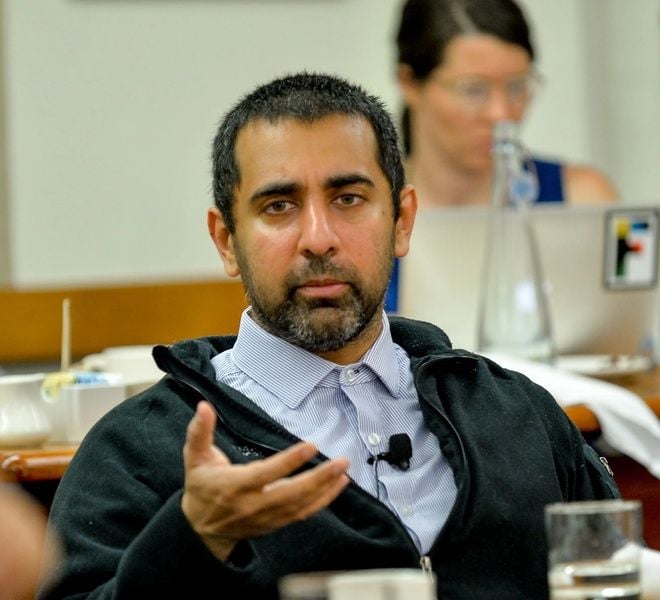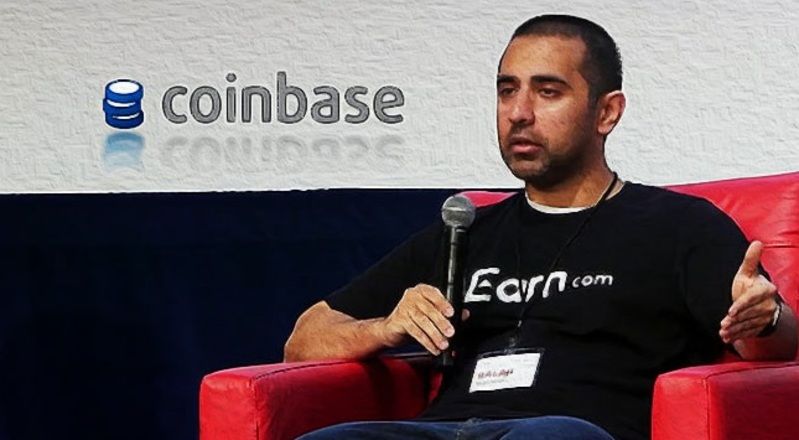Balaji Srinivasan Age, Wife, Family, Biography & More
| Bio/Wiki | |
|---|---|
| Full name | Balaji S. Srinivasan [1]Linkedin - Balaji S. Srinivasan |
| Profession(s) | • Investor • Entrepreneur |
| Physical Stats & More | |
| Height (approx.) | in centimeters- 173 cm in meters- 1.73 m in feet & inches- 5’ 8” |
| Weight (approx.) | in kilograms- 65 kg in pounds- 143 lbs |
| Eye Colour | Light Brown |
| Hair Colour | Black |
| Career | |
| Awards, Honours, Achievements | • In 2010, he created a pre-pregnancy genomic test at Counsyl that can be used to identify a range of heritable diseases. This test helped him win the Wall Street Journal Innovation Award for Medicine and became the basis for Balaji’s MIT TR35 Award. MIT TR35 Award names the world’s top 35 innovators under the age of 35. • In 2010, his Counsyl test was accorded as one of the Scientific American’s Top 10 World-Changing Ideas. • In 2018, he was listed in Fortune magazine's "The Ledger 40 under 40" list of young venture capitalists responsible for transforming the world of finance and technology. |
| Personal Life | |
| Date of Birth | 24 May 1980 (Saturday) |
| Age (as of 2023) | 43 Years |
| Birthplace | Long Island, New York |
| Zodiac sign | Gemini |
| Nationality | American |
| Hometown | Long Island |
| College/University | Stanford University, California |
| Educational Qualification(s) | • Bachelor of Science with specialisation in Electrical Engineering (1997) • Master of Science with specialisation in Electrical Engineering (2000) • PhD in Electrical Engineering |
| Political Inclination | Republican Party Note: In 2017, he was one of the few influential people from Silicon Valley to back Donald Trump during his presidential campaign. [2]Bloomberg |
| Controversies | • Doxxing of a reporter In an email to blogger Curtis Yarvin in 2013, Srinivasan proposed doxxing a journalist in response to an article published by TechCrunch, outlining Silicon Valley's ties to the anti-democratic neo-reactionary philosophy. The email read, "If things get hot, it may be interesting to sic the Dark Enlightenment audience on a single vulnerable hostile reporter to dox them and turn them inside out with hostile reporting sent to their advertisers/friends/contacts." [3]Business Insider • Row with Taylor Lorenz Balaji and Taylor Lorenz, a reporter for The New York Times, got into a Twitter dispute in July 2020. Lorenz tweeted on 30 June about Korey, the co-CEO of Away, and her publicly available Instagram story. The narrative criticised media outlets' business practices and editorial choices, which Lorenz called "disappointing" and "incoherent" in a tweet. After this tweet by Lorenz, Balaji said, "the New York Times reporter is ‘playing victim’ and is a member of a group of journalists who are sociopaths.” Lorenz claimed that a number of Silicon Valley venture capitalists, including Srinivasan, had made fun of her on the social audio app Clubhouse. [4]Vice |
| Relationships & More | |
| Marital Status | Not Known |
| Affairs/Girlfriends | Not Known |
| Family | |
| Wife/Spouse | Not Known |
| Parents | Balaji’s parents are physicians who emigrated to New York from India. |
| Siblings | Brother- Ramji Sister- None |
Some Lesser Known Facts About Balaji Srinivasan
- Balaji S Srinivasan is an Indian-American investor and entrepreneur. He has served as the Chief Technology Officer (CTO) of the crypto exchange company Coinbase and as a general partner in Andreessen Horowitz. He made early investments in a number of tech startups and cryptocurrency protocols. Counsyl, Earn.com, Teleport, and Coin Centre are just a few of the businesses he co-founded that were eventually acquired by other businesses.
- He concentrated primarily on genomics research during his graduation. He was a co-author of papers on a variety of topics, such as Mendelian disease, genetics of complex diseases, pharmacogenetics, population genetics, and genomics of microbes and humans.
- In January 2008, he became one of the founding members of Counsyl and later went on to lead the organisation as its Chief Technology Officer (CTO). The idea for a genomic startup, which eventually took the shape of the company Counsyl, originated in a dorm room at Stanford. Balaji spent more than ten years, working in the field of genomics, five of those years were spent at Counsyl, where he was responsible for looking after the scientific codebase, marketing, design, public relations, recruitment, training, fundraising, and technical vision. On 31 July 2018, Myriad Genetics paid $375 million to acquire Counsyl. He then left his position as an executive at Counsyl in November 2012 to pursue opportunities in other tech-related fields.
- In 2013, he became a general partner at the venture capital firm Andreessen Horowitz, and two years later, he was elevated to board partner status.
- In 2014, he co-founded Teleport, a San Francisco, California-based search engine designed for digital nomads, that was later acquired by Topia in 2017.
- He became a board member of Coin Centre in 2014, a company he co-founded that was dedicated to developing and advocating sound government policy toward digital currencies such as Bitcoin and open blockchain technologies.
- Later, he became the CEO of Earn.com after co-founding the company in October 2017. Earn.com was acquired by Coinbase in 2018 for about $120 million.
Coinbase is a digital currency wallet and platform where consumers and merchants can transact with new digital currencies like Bitcoin, Ethereum, and Litecoin. After that, Balaji was named Coinbase’s first Chief Technology Officer (CTO). Balaji, along with Zach Segal, Dave Bean, and Max Branzburg, was in charge of finding and closing deals totalling over $200 million for Coinbase Earn while he was employed at Coinbase, which included over $120 million from the Stellar Foundation. He was also in charge of the USDC stablecoin’s launch, which went on to have a market value of more than $33.4 billion.
1/2 Really enjoyed my time at Coinbase working with my friend @brian_armstrong. The Earn integration was successful and we’ve closed ~$200M in deals for the new Coinbase Earn. Was also my privilege to help with shipping new assets, launching USDC, & getting staking/voting going.
— Balaji (@balajis) May 4, 2019
- Since 2006, Balaji has been a lecturer in Stanford’s computer science and statistics departments. He was an instructor for “Startup Engineering” Massive Open Online Courses (MOOCs) in 2013, which attracted over 250,000 students globally. He has taught bioinformatics at Stanford and published articles on clinical and microbial genomics.
- In January 2017, Balaji met with US President Donald Trump to talk about the FDA’s (the US Food and Drug Administration) future. He was also considered for a job with the FDA because of his knowledge in areas like computational biology and digital payments. Following his candidature for an FDA job, Balaji removed every tweet he had ever posted in which he publicly criticised the agency for holding back startups and pharmaceutical companies’ ability to innovate by enforcing unnecessary rules. [5]CNBC
- In July 2017, the Nakamoto coefficient, which measures the minimum number of independent entities that can act collectively to shut down a blockchain, was introduced by Srinivasan and Leland Lee. The higher the minimum Nakamoto coefficient value, the more decentralised the system. These days, blockchain decentralisation benchmarks use this metric.
- In an interview, while talking about his motivation for entering the crypto industry, he said,
I’m interested in businesses that take digital bits and turn them into interfaces for physical atoms. I’m also interested in drones, Bitcoin and 3D printing. The Internet is programmable information. The blockchain is programmable scarcity.”
- Srinivasan has served as an advisor and angel investor for companies like Alchemy, Benchling, Cameo, CoinTracker, Culdesac, Dapper Labs, Deel, Digital Ocean, Eight Sleep, EPNS, Farcaster, Gitcoin, Golden, Instadapp, Lambda School, Levels Health, Locals, Messari, Mirror, OnDeck, OpenSea, Orchid Health, Prospera, Replit, Republic, Roam Research, Skiff, Soylent, Stability AI, Starkware, Stedi, Superhuman, Synthesis, and Zora Labs. Some of his early investments in many important crypto protocols include Bitcoin, Ethereum, Solana, Avalanche, NEAR, Polygon, Chainlink, XMTP, ZCash, and more.
- In an interview, while speaking about the future of blockchain technology and Bitcoin, he said,
By, say, 2025-2030, I expect that there will be multiple jurisdictions that allow the tokenisation of virtually any scarce resource, all the way down to personal tokens. The rise of all these new tokens and public blockchains means the internet will, in the long term, become by far the biggest ‘stock’ market — once the regulatory issues are worked through — just as it has become the biggest library.”
- In 2020, CoinDesk gave him the title of ‘The Man Who Called COVID’ for providing estimates of the severity and intensity of COVID-19 accurately. In an interview, while speaking about his forecasts regarding the consequences of the coronavirus, he said,
I was like, this looks actually very serious. And it is not being covered enough. And it’s being treated as if it’s something that happens to foreigners, haha. I actually hesitated to tweet about it for a while, simply because it was going to be seen as, you know, ‘paranoid’ or whatever. What if this coronavirus is the pandemic that public health people have been warning about for years?” [6]CoinDesk
- In April 2021, during the COVID-19 outbreak in India, Balaji Srinivasan contributed $50,000 as aid in cryptocurrency to help with the relief efforts. Later, on Twitter, he pledged to donate an extra $50 for every retweet of his post up to a maximum of $100,000. [7]The Economic Times
- Balaji made headlines in the financial industry on 17 March 2023, when he placed a $1 million bet on Twitter. According to the terms of the bet, he would give Twitter user James Medlock $1 million if the price of Bitcoin would not reach $1 million per coin in 90 days. In a bearish market, Bitcoin was trading at $26,000 when Srinivasan placed the bet. It was decided that the bet would be paid out in USDC stablecoin, a digital stablecoin linked to the US dollar. As per Srinivasan’s estimates, the calculated ratio of his speculated outcome was forty to one. Many people questioned this decision and linked it with terms such as clout chasing, marketing ploy, and a pump-and-dump scheme. In support of his action, Srinivasan pointed to the concealed downfall and collapse of the US banking system and issued a warning about the dollar’s depreciation and the Federal Reserve’s move to print money, both of which could cause hyperinflation. He also took the initiative to inform Twitter users about the depreciation of the US dollar by offering $1,000 per tweet for the top 1,000 tweets.
The BitSignal
How do you ring the fire alarm on the internet?
How do you show it’s not a false alarm?
I am putting up the BitSignal.
$1M in BTC to alert us to the stealth financial crisis.
$1000 per tweet, for the best 1000.
Reply with your charts, graphs, stats, memes!
Bring… pic.twitter.com/yV7cjCXVcY— Balaji (@balajis) March 16, 2023
- On 2 May 2023, Srinivasan withdrew the bet, stating that it had concluded “by mutual agreement.” Medlock acknowledged receipt of the payment on Twitter. Later, he uploaded a video to Twitter with the caption “I burned a million to tell you they’re printing trillions” in which he went into great detail about the state of the US economy. He went on to explain the true motivation for the bet, stating that it was to create awareness among the public.
I just burned a million to tell you they're printing trillions. pic.twitter.com/pX5622rjUO
— Balaji (@balajis) May 2, 2023
- On 4 July 2022, Balaji Srinivasan’s book “The Network State: How to Start a New Country” was released. In the book, Srinivasan discussed his theories about how like-minded individuals could form online communities that would eventually meet in person to form new societies, and how these communities could be driven by cryptocurrencies. He put forth the idea of “cloud-first, land last” in the book. The Wall Street Journal soon listed his book as a bestseller.
- On 7 February 2023, he started a podcast called “The Network State Podcast” in which he started discussing how to manage millions of employees, make billion-dollar investments, and create a whole new class of nation with global policymakers and entrepreneurs. The podcast is available on YouTube, Spotify, and Apple Music.
- Balaji relocated to Asia from America in 2021 as a result of the various growth prospects available in Asian nations like Singapore and India.
Btw, I rarely post personal news on here, but I moved to Asia awhile back and will be splitting time between India 🇮🇳 and Singapore 🇸🇬.
Why? They are optimistic on technology, they’ve brought hundreds of millions of people online, and they both speak தமிழ் & have great dosas! 🙂 pic.twitter.com/Z7YL0R1NIK
— Balaji (@balajis) January 29, 2021
- In November 2023, Balaji shared a detailed tweet about the advantages of funding Indian startups. On 26 November 2023, Prime Minister Narendra Modi commended him on Twitter for expressing optimism about India’s investment climate. In the tweet, Modi said,
I love your optimism and will add – the people of India are trendsetters and trailblazers when it comes to innovation. We welcome the world to invest in our nation. India won’t disappoint.”
- He suggests several books for tech company founders, including Josh Storrs Hall’s Where Is My Flying Car?, Andy Grove’s High Output Management, Matt Mochary’s The Great CEO Within, and Matt Ridley’s How Innovation Works: And Why It Flourishes in Freedom.
References/Sources:












